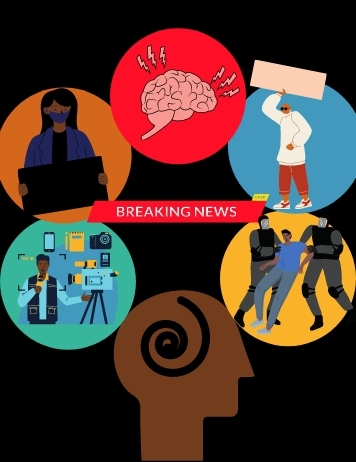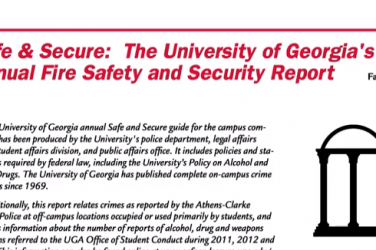For Black journalists, covering race and reporting on tragedy can be especially triggering when they are exposed to Black trauma. According to the Dart Center for Journalism and Trauma, journalists are often at the forefront of traumatic news events, and exposure to these incidents can result in mental health concerns that include PTSD, fatigue and burnout.
Ernie Suggs, a race and culture reporter for the Atlanta Journal-Constitution, is no stranger to covering widespread racial justice protests and news stories about Black trauma.
Why It’s Newsworthy: Black trauma is a constant in the news cycle. While the worldwide protests against racial injustice and police brutality from May have died down, the repercussions of those protests are still felt today.After covering Ferguson, Baltimore, Charlotte, after covering the Charleston massacre when the people were killed at the church — I was there for that,” Suggs said. “After a while, you do get a sense that there is some kind of strain that’s going on within yourself.”
Black Lives Matter Protests
The resurgence of the Black Lives Matter movement in late May was in response to the murder of George Floyd, a Black man, by white officer Derek Chauvin. Floyd’s death sparked worldwide protests and demonstrations calling for justice and condemnation of police brutality, not only for Floyd but other Black victims such as Breonna Taylor and Ahmaud Arbery.
According to data by the Census Bureau’s 2020 Household Pulse Survey, the rate of anxiety and depression among African Americans rose from 36% to 41% in the week after Floyd’s murder.

Suggs said at some points, he felt he needed to take a break.
“You feel sad, you dread waking up in the morning and knowing that something has happened somewhere in the country and you have to go to it,” Suggs said. “You dread that kind of stuff. And you long for covering the city council meeting, you long for doing a profile with somebody about their animal collections.”
Mental Health Disparities in Black Community
Racial disparities exist in regards to mental health care services. According to the American Psychiatric Association, only 1 in 3 African Americans who need mental health care receive it. Stigmas surrounding mental health in the Black community also serve as barriers to seeking mental health care. One study reported 63% of African Americans believed depression is a personal weakness.
“Black people in general, but Black men in particular, don’t always seek help. They don’t always feel that they need help,” Suggs said. “And I have the problem myself, I am not afraid to admit, but at least I knew that at some point that I had to take a break.”
Amir Vera, president of the Atlanta Association of Black Journalists, said covering race hits him differently than it would other journalists.
“The experience has been jarring because as a Black male myself, and seeing these stories, it hits me,” Vera said.
Rayshard Brooks was a Black Atlanta resident who was fatally shot outside of a Wendy’s restaurant by white officer Garrett Rolfe. Brooks’s death occurred at the tail end of tense Black Lives Matter protests in Atlanta last summer.
“I would say when Rayshard Brooks died, I had like a moment where I was like ‘Dang, there’s a lot of death,’” Vera said. “So I had to stop reading and count to three a little bit.”
Predominantly White Newsrooms and Black Journalists
A Pew Research Center survey of data from 2013-2017 found that only 7% of newsroom employees are Black. In a Nieman Foundation for Journalism feature, Martin G. Reynolds, co-executive director of the Maynard Institute for Journalism Education, said predominantly white newsrooms can act as hostile work environments for Black journalists and other journalists of color. These work environments can act as another barrier for Black journalists to discuss their emotional wellbeing.
I think, if I don’t bring it up, or if I didn’t bring it up to my editors and to my bosses that I needed to take a break, then I would have been everywhere,” Suggs said. “I think, unfortunately, a lot of people say, ‘Well, he’s doing fine. He’s not saying anything.’”
Vera noted that the events of May and June caused newsrooms to pay closer attention to their Black journalists.
“I think last summer they started to, in a sense, have more awareness of how things can affect the journalist covering this, specifically the Black journalists who are covering this,” Vera said. “And then, even in those places where there are Black or brown people in places of leadership, they were paying real close attention, asking folks how they’re doing and stuff like that. There was a lot more of that than there was before.”
Suggs said he believes U.S. newspapers and media organizations are putting together plans to help their reporters during stressful situations, but it’s a matter of reporters using those resources.
Trauma Resources for Journalists
The Dart Center for Journalism and Trauma and the Committee to Protect Journalists are just a few organizations helping journalists process work-related trauma. In response to the widespread protests that began in May, journalist Sonia Weiser even founded the Black Journalists Therapy Relief Fund to provide assistance for Black journalists facing financial hardship who were unable to pay for the mental health support they need during this time.
“A lot of the times in the Black community, even outside of journalism, where we’ve been conditioned to keep everything to ourselves and not seem weak or not seem like an issue,” Vera said. “But if you’re having mental health issues at work, you need to take that really seriously and tell somebody whether it’s a friend, a manager — you just need to tell somebody.”
Laura Nwogu is a senior majoring in journalism in the Grady College of Journalism and Mass Communication at the University of Georgia.







Show Comments (6)
Carlos
I wonder if black reporters feel obligated to spin police shootings as racist events even if they are regular arrests gone bad on the suspects part and how many reports like this are made by black reporters. It’s painfully obvious that most shootings were the fault of the suspects but media simply omits facts in police officers favor. This very article mentions Ferguson and Mike Brown is still used as an example when most of know better although many are brainwashed by an unscrupulous media. I do hope they just unscrupulous and not actually benevolent but the media does appear to be failing us. I am not racist but feel that media that does not report truth no matter how inconvenient is very racist and history is showing this and in the end unfair reporters will be hated by Americans
Jmamba7
“I am not racist but…” usually said by someone very prejudiced or- racist